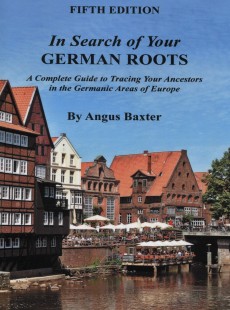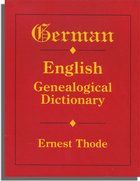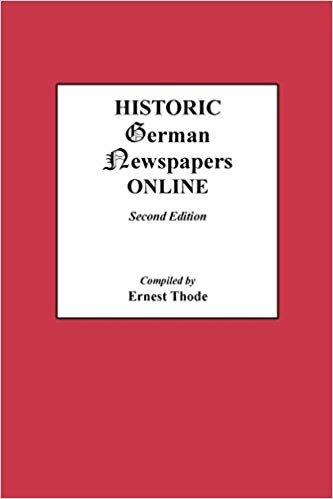
Angus Baxter & Ernest Thode: One-Two-Three Punch for German Researchers
In recent issues of “Genealogy Pointers,” we have highlighted Angus Baxter’s In Search of Your German Roots. Fifth Edition. Besides Baxter’s description of German history’s impact on its genealogy sources, equally informative chapters in the Fifth Edition cover German genealogy websites, German-Jewish records, the German records of the LDS Church, the archives of Germanic genealogy, the Germans in the U.S. and Canada, record holdings in Germany, and much more.
If you have German ancestors, it’s only a matter of time before you will have to contend with documents written in German and, if you go back prior to 1945, the German fraktur style of writing. You won’t find all the thousands of specialized terms that arise in German genealogical source documents in a standard German-English dictionary. You WILL find them in Ernest Thode’s masterful German-English Genealogical Dictionary. Since 1992, Mr. Thode’s Dictionary ranks as the most valuable desktop tool for translating German genealogical documents.
And most recently, Ernie Thode has given us an invaluable new resource for German genealogists: Historic German Newspapers Online. Now in its second edition, this important resource identifies over 2,000 German-language newspapers published all over the world, and each is at least 50 years old. Researchers will be amazed at the range of information available to them online in German-language newspapers. Even better, they not only contain clues relating to the whereabouts of your forebears, they also provide context for their life and times.
Scroll down to learn more about the best one-two-three punch for Germanic genealogy available in print.
In Search of Your German Roots. Fifth Edition.
This guide is designed to help you trace your German ancestry not only in Germany but in all the German-speaking areas of Europe. First, it discusses the LDS Church’s International Genealogical Index (IGI), which contains hundreds of thousands of entries from German parish registers. Then the narrative takes the reader back to the old country, where sources and archives are discussed in detail, especially Evangelical and Catholic Church records and records of state and city archives. Finally, Mr. Baxter presents a list of family archives, a list of genealogical associations in Germany, a list of German genealogical associations in the U.S., and a bibliography. The 2008 update to the fourth edition includes many websites for these records. View Book Details
German-English Genealogical Dictionary
Ernest Thode’s Dictionary is designed for the family researcher who has little or no knowledge of German but who nevertheless needs to make a translation of German-language documents. The Dictionary covers thousands of German terms and defines them in single words or brief phrases. Among the many categories of entries included in the Dictionary are family relationships, days of the week, map terms, legal terms, signs of the zodiac, coins, place names, historical territories, geographical terms, occupations, titles, military ranks, types of taxes, illnesses, calendar days, male and female given names, heraldry, abbreviations, and common genealogical words from Danish, Dutch, French, Latin, and Polish. In conjunction with a standard German-English dictionary, the user of this work should be able to make a word-by-word translation of any German document and understand it. View Book Details
Historic German Newspapers Online. 2nd Edition
Most of the papers cited are from Germany and the former Austro-Hungarian Empire, though there are papers cited here from as far afield as China and Oklahoma. A single site hosted by the Austrian National Library, for example, has digitized millions of pages in hundreds of titles from Austro-Hungary, with the years 1700-1875 now almost fully digitized, as are World War I newspapers from 1914-1918. Hundreds of other websites are hosted by libraries, universities, museums, and institutions, many with English language interfaces.
The genealogical information you can find in these newspapers is almost limitless. It includes notices of births, marriages, and deaths from civil registrations, baptisms and wedding announcements from churches, intentions to emigrate, trade news, lists of pupils, appointments to office, promotions, transfers, retirements, deaths, estate sales, lists of hotel guests, and a multitude of everyday notices. You’ll be amazed at the range of information available to you online in German-language newspapers. View Book Details
Recent Blog Posts






